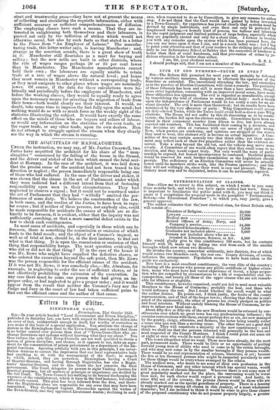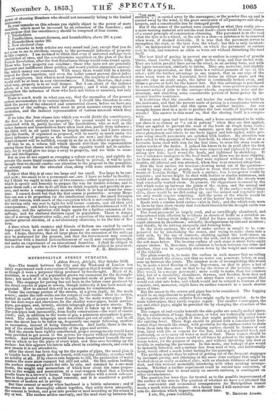REPRESENTATION OF CLASSES.
Sin—Allow me to revert to this subject, on which I wrote to you some three months back, and which you have again noticed last week. Since it is important to familiarize the public mind with it, you may not think it amiss if I recapitulate the proposal made in the pamphlet "Parliamentary Reform—the Educational Franchise "; to which you, very justly, gave a general approval.
The author estimates that the'new electoral class, for Great Britain only, will consist of—
Ministers of Religion 30,000 Lawyers
1137,001
Medical men Retired Officers of Army, Navy, and Company's service 14,500 Certificated Schoolmasters 3,600 Graduates not included above 9,000 Persons not included above who are in- terested in Literature, Science, or Art . 5,500
He would gladly give to this constituency 100 seats, but he contents himself with 70, made up by taking one seat from each of the smaller boroughs which now return two Members.
He divides the country, somewhat arbitrarily, into districts, five of which would return two Members each, the rest one. County divisions, of course, influence the arrangement. Population seems to have been taken as the guide too exclusively. Now here is a most excellent constituency, the very elite of the country ; including all the persons who possess any public certificate of higher educa- tion, many who must have had varied experience of travel, a large propor- tion who are compelled by circumstances to a life of respectability and cir- cumspection, and nearly all those of the upper classes who are not remark- able for idleness or stupidity.
This constituency, however organized, could not fail to send most valuable Members to the House of Commons ; probably the best, and those who would influence the rest. But I doubt whether the result would be what the author desires. He points out, I think justly, the faults of the county representation, and of that of the larger towns; showing that the one is com- posed of the squirearchy, the other of persons too closely pledged on politics and local interests. Without unduly blaming the House of Commons, he de- sires to infuse new blood into it.
About fifty-five or fifty-six of the new Members would be returned by con- stituencies over which no great town has any predominating influence ; the counties conterminous with these, except perhaps five or six, are now managed by the gentry, clergy, attornies, and farmers, the latter being usually rather a cause sine qua non than a moving cause. The other three act a good deal together. They will constitute a majority of the new constituency : and I think we shall see that the persons returned will generally be the best and most respected of the County Members. I think I could point out some six or eight at once who would be sure of their election.
This is not altogether what we want. These men have already, for the most part, permanent seats. There would be little or no opportunity of putting forward young men of ability who used to come in by the rotten boroughs, and who may now come in by the smaller boroughs if they possess wealth. There would be no real representation of science, literature, or art; because the five or ten thousand persons who might be suspected peculiarly to care for these things would be everywhere swamped by the others.
The medical men, who desire to see some of their own profession in the House of Commons, and any other interest which has special wants, would still be in a state of chronic discontent. Wherever there is not some man of great popularity marked out for the place, the canvassing would be wore than now, for each elector would expect a personal visit. And lastly, in some fifty out of the seventy, the persons chosen would be those who are already marked out as the special guardians of property. There is a leaning to support property among all classes in this country, of a most wholesome character; but I am inclined to think it would be wiser to give those classes of the proposed constituency who do not possess property largely, a greater
power of choosing Members who should not necessarily belong to the landed aristocracy. In your remarks on this scheme you rightly object to the power of mere
numbers, which must be increased by an extension of the franchise ; and you propose that the constituency should be composed of four classes.
L Freeholders. 2. Fundholdera, tenant-farmers, and householders, above 20/. a year. a. Householders under 201. 4. New electoral class. Your remarks in both articles are very sound end just, except that you do
not seem to me to attribute enough to the permanent influence of property in this country. I am inclined to think that even if universal suffrage were established at once, and the constituencies equalized on the plan of the first French Revolution, after the first disturbance things would come round again. Those who have property can combine ; those who have not are generally ignorant and indifferent about politics, and would yield to organized canvass- isg, which money can command. With many there would still be a kindly respect for their superiors, and even the ballot cannot prevent direct influ- ence of employers. And what is most important, the majority of those elected would still be at least in easy circumstances. I think, therefore, that come what may, property is in no real danger. But I ant afraid of the indirect effects of a too ostentatious care for property ; and I wish especially to strengthen the influence of those who have not riches or numbers, but only intelligence.
There is much truth in what you say, that the anomalies of the present system accommodate it to various interests. I should like therefore to esta- blish the power of the educated and commercial classes, before we have any extension of the suffrage, which must in great measure sweep away those anomalies, and the indirect representation of various interests which they create. If we take the four classes into which you would divide the constituency, the first is based entirely on property ; the second would be very closely connected with it, partly because of the fundholders, who as well as the richer farmers and householders have often land also, partly from influence ; the third will in all quiet times be largely influenced ; and I have shown that the fourth, if organized as proposed, will be nearly as much under the direct influence of property as the counties are now ; and that the educa- tional element will be nullified, except in so far as it is allied to property. If this be so, a reform bill which should distribute the representation among these four classes with anything like equality would not be satisfac- tory, for it would give too large a sway to property, and too little to num- bers and intelligence.
But as you do not expect so sweeping a reform next year' and rightly de- precate the more timid counsels which are likely to prevail, it will be quite enough that we should confine our attention to the proposal in the pamphlet, of seventy seats for the educated class, along with some extension of the franchise.
I object that this is at once too large and too small. Too large to be car- ried now ; too small to be a permanent mel.sure. I have no belief in finality ; but I think we ought to take one of two courses,—either to propose a measure which is openly and honestly to prepare the way for further reforms, and to make them safe ; or else to do all that we think requisite and possible at pre- sent, and make a comprehensive measure which is to last at least for some time. I cannot doubt but that the first course is preferable: seventy Mem- bers are not a fit proportion for the intellectual classes; the small boroughs will still remain, with much of the corruption which is not confined to them ; the having only one seat to fight for will insure contests, and all their evil consequences ; and before long another measure of disfranchisement will be necessary, and the agitation will begin again for a further extension of the suffrage, and for electoral districts equal in population. There is danger also of a strong Conservative rally, and of a rejection of the measure, and of another general election, of a revolutionary character, to fix the fate of Re- form.
A time when both enemies and friends of Reform are excited by undue hopes and fears, is not the best for a measure at once comprehensive and safe. I hope, therefore, that all large plans for the extension of the suffrage may be postponed for the present, and that the Government may content themselves with a limited disfranchisement of small and corrupt boroughs, and make an experiment of an educational franchise. I shall be obliged to you to allow me space for a few further remarks on the subject in your next. F. H. DietuNsoar.



























 Previous page
Previous page